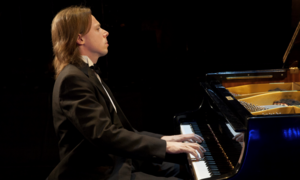Robert Moody and the Winston-Salem Symphony did it up right in helping Winston-Salem celebrate 100 years since the consolidation of the towns of Winston and Salem in 1913 (quoth the Psalmist: “Behold how good and how pleasant it is for brethren to dwell together in unity”), with a program featuring three contemporary American works and a popular masterpiece, as well as “pictures” to accompany them (projections by artist Andreas Fischer).
The evening opened with a world premiere by Winston-Salem based composer Dan Locklair, “Hail the Coming Day,” a relatively brief piece commissioned specifically to mark the above-mentioned centennial. Within its five minutes, the piece moved through a varied palette of moods, with an almost melancholy tone to the opening, and a prominent metallic clang, which to my ears suggested hard work (laying the railroad to Winston-Salem, or perhaps factories), then lyrical flute and oboe writing and a descending diatonic bass leading to writing for the large brass section (Moravians?). An accessible piece, but without the boosterish cliché that might suggest itself to a less original voice.
Next up was a work that has been a personal favorite of mine for many years, the Symphony No. 2 of Alan Hovhaness, a prolific American composer who, although producing many works over a long career, remains primarily known because of this relatively early work (premiered in 1955, when the composer was 44). The lush writing and rich consonant chords from the strings (though moving in chromatic directions far from traditional harmony) were wonderfully realized, and the second part of the double fugue (marked Allegro Vivo) was full of fire. The entire work has a particularly mystical and religious tone, and it would be hard to imagine a more effective and beautiful performance than the one that Moody drew from his band.
What really caused my jaw to drop with amazement, however, was the 2007 work by young (36) composer Mason Bates, who was present for and participating in the performance (controlling the electronic effects from his Macintosh). This was Liquid Interface, which might have seemed daunting for some in anticipation (the piece has a high-concept program relating to various manifestations of water, ranging from glaciers calving through Hurricane Katrina, and a prominent electronic track melding with the orchestra), but proved to be highly appealing and absorbing as played by Moody and the WSS, referencing various musical styles (I particularly enjoyed the orchestral rendition of electronic “echoes”, as well as Bate’s take on big-band jazz, with a drum-set driving the large brass section that was on stage all evening). Bates is a master of orchestral effect, and he has the narrative sense that allows him to construct a piece of almost a half-hour in breadth without losing the listener, plus a rich sense of humor (e.g., the percussionist tooting a small harmonica). The piece received a very warm welcome, not just from this fifty-something listener, but from the next generation older, which is a very significant part of the WSS’s base. If you haven’t heard from Bates yet (I hadn’t), you can be very sure that this is one talent that you will be hearing more from, and I very much hope that Moody and the WSS will be able to commission a piece especially for them from him. (The curious can find a fine recording of the West Coast premiere of the work with Marin Alsop conducting, at instantencore.com).
The Ravel orchestration of Pictures at an Exhibition by Modest Mussorgsky is the work that everyone knew going into the Stevens Center, and Moody turned in a state-of-the-art reading, with particular plaudits due to the saxophone solo in “The Old Castle” and the burning muted trumpet solo of principal Anita Cirba in “Samuel Goldenberg and Schmuyle” (the first solo bow, and with good reason!) The rousing conclusion, with tam-tam and bells, was utter perfection.
Winston-Salem has reason to be enormously proud of such world-class music making. Bravo, Moody! Bravo, WSS! Bravo Locklair, bravo Bates! Bravo, Winston-Salem!











